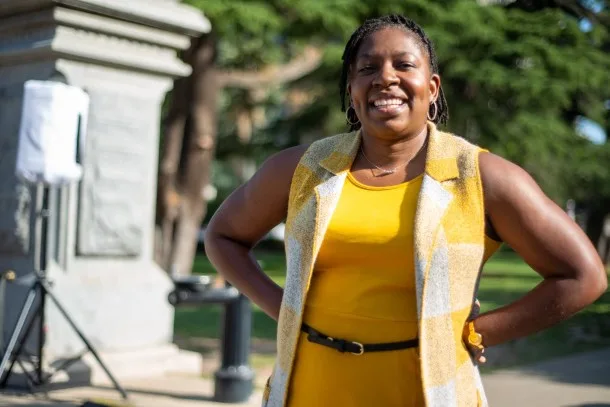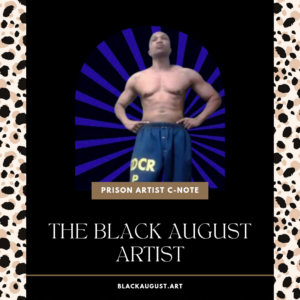Carmen-Nicole Cox Shares Personal Connection To The Work
By Genoa Barrow | OBSERVER Senior Staff Writer
Carmen-Nicole Cox is a local attorney, serving as ACLU California Action’s director of government affairs. Cox is currently making a case for restored voting rights for incarcerated individuals.
She is pushing for the passing of Assembly Constitutional Amendment 4, legislation authored by Black Assemblymember Isaac Bryan (D-Los Angeles) that would remove the part of California’s constitution that disqualifies people serving in a state or federal prison from voting.
The fight, Cox says, starts with unapologetically calling out racism’s role and its impact.
“We have to actually name the fact that this rule, this constitutional amendment, and these elections, these statutes that implement the law that says, if you are incarcerated in state prison, or federal prison for a felony, then you can’t vote, we have to name that that had racial animus as its motivator,” she says.
“That’s one of the things I appreciate Assemblymember Bryan for – being very frank, unashamedly asserting that this has a history in suppression and the restriction of voting rights for Black people, brown people, and following our history back here in California with poor people. One of the things we talked about is how this constitutional provision that says you cannot vote if you’re in prison, actually has its roots in our efforts to respond to Reconstruction.
“What we did is we enfranchised people. What folks wanted to do, who wanted to maintain this division and this hierarchy of personhood, was to say, ‘But not if you’ve been convicted of a crime.’ And then they made it really easy for you, if you’re a Black person, to be convicted of a crime by creating more and more felony criminal provisions and then targeting us when you’re talking about mass incarceration. First, you have to put the law on the books and then you have to direct its enforcement at a group of folks, at least if your goal is to target those groups of folks for some negative treatment. And that’s exactly what happened.”
There’s no real reason that folks in prison shouldn’t be allowed to vote, Cox says.
“There’s no relationship between having committed a crime and voting. What the research tells us is that if you get to vote while you’re incarcerated, you have like a 50% lower recidivism rate, so you’re less likely to reoffend upon release. It’s not as if you are convicted of a crime and now you can’t read, you can’t contemplate the consequences of legislation, or the effect of a person assuming office. There’s just no relationship. This is just punishment.”
There are some who will argue that, yes, it’s all about punishment and losing certain rights is part and parcel to one’s sentence. Others believe it works to the power structure’s advantage to ban prisoners from voting, as there is power in numbers and with so many Blacks behind bars, lifting the ban would sway decisions and elections a certain way.
“I think from a systemic perspective, the goal was absolutely to exclude people whose interests were not always aligned with those folks who are in power,” Cox says. “That’s why voting is the cornerstone of our democracy.
“It gives you a voice and sometimes that voice is in dissent,” she continues. “But if you are the system in power, you don’t want the voice that is in dissent. It could grow, it could influence, it could become the majority. It could at least influence the majority, so I think that’s why this constitutional amendment exists in the first place.”
Another organization, Initiate Justice, made a similar effort with the Voting Restoration and Democracy Act of 2018, but it failed to get the necessary number of required signatures. According to the California Secretary of State’s Office, people with criminal histories can register to vote in certain circumstances, such as if they’re in local detention facilities serving a misdemeanor sentence, serving a felony jail sentence or awaiting trial. According to the law, those in state or federal prison can resume voting once they’re on parole, probation or have been placed in supervision programs.
In addition to ACLU California Action, ACA 4 has the support of organizations such as Initiate Justice, the Anti-Recidivism Coalition, the Ella Baker Center for Human Rights, and the League of Women Voters.
“The cost is, quite frankly, outweighed by benefits and the value to our citizenry – and not just the folks who are inside either,” Cox says.
Having moved along in the legislative process in May, ACA 4 can now be taken by the Assembly.
“The coalition is going to help to ensure we get a two-thirds vote,” Cox says.
There’s also calls for change from the incarcerated population themselves.
“We have heard from folks inside and what they’re saying is, it matters to us, too, because our children, our grandparents, our parents are all impacted by these rules,” Cox says. “People don’t go inside and then all of a sudden they’re divorced from reality – political or otherwise. People are very excited about the opportunity to vote.”
The fight to get voting rights for incarcerated people predates most of the folks who are now at the state Capitol. Lawmakers come and go and it’s important to keep the issue at the forefront, Cox says.
“We continue to talk about the importance of voting in our communities, including by encouraging folks to run for office,” she says. “There are so many local entities that are being created: the [California] Black Women’s Collective, Black Women Organized for Political Action. These organizations are popping up and as a consequence, the reach of the narrative about the importance of voting continues to broaden and be amplified.”
According to “Locked Out: 2022,” a study by the Sentencing Project, a Washington D.C.-based nonprofit, an estimated 4.6 million people in the United States were being disenfranchised – deprived of the right to vote – because of a felony conviction. That number is down by 1.57 million since 2020 due in part to several states, including California, passing laws that restored voting rights to some formerly incarcerated individuals.
Other key findings: 1 of 50 adults – 2% of the total U.S. voting-eligible population – is disenfranchised due to a current or previous felony conviction.
One in 19 African Americans of voting age is disenfranchised, a rate 3.5 times greater than that of non-African Americans. More than 5.3% of the adult African American population is disenfranchised compared to 1.5% of the non-African American population.
Initiate Sacramento puts the number of California’s disenfranchised at 180,000.
“We know the sky won’t fall,” Cox says of restoring voting rights to people in prison.
“It’s got no relationship to public safety and folks inside know that,” she continues. “They appreciate that and they’re coming home. We want to prepare them. We want to energize them. We want them invested in the positive outcomes and impacts in their community.”
File Marked ‘Personal’
“People don’t go inside and then all of a sudden they’re divorced from reality, political or otherwise.”
Fighting for ACA 4 isn’t something Cox is handling simply because it’s in her caseload. Advocating for incarcerated people is personal for her. Her father died on a cold cell floor in a Cleveland prison.
“I knew that my father was addicted to drugs and I knew that his criminal conduct was drug-seeking behavior,” Cox shares. “I didn’t fully appreciate at the time that there was actually treatment, that there were substance abuse treatments available to some folks and then not to others. My father never got any of that.
“The consequence of his drug-seeking behavior wasn’t that we need to get you some treatment so we can keep you unified with your family, which is what is most likely going to make you motivated and keep you strong because we know relapse is a part of recovery. No one ever said to my father, ‘You go get this program and then we’re gonna see if that will keep you from making poor choices – choices that violate the law.’”
Incarceration, Cox says, shouldn’t have been the only option.
“It wasn’t the result for everyone, but it was certainly the result for many Black folks struggling with crack and the crack epidemic. Instead of us identifying it as a public health crisis because it was devastating Black and brown communities, instead we were like, we’re gonna have a war on drugs and the victims of that war will include folks who are struggling with drug addiction. We were criminalizing possession, even possession for personal use.
“As far as I know, my father was never convicted of possession for distribution or transportation. The man was a drug addict and he needed help. He was also a dad. He was a big brother. He was my mom’s friend, even once they weren’t together anymore. They grew up together and they were young and dumb together and she still had love for him. He was also an amazing artist. He was more than just a person who needed treatment and didn’t get it.”
Cox was 17 when her father went to prison for robbing a bank. When he died, she was an adult, almost done with law school.
“By that time, I had had an introduction to the criminal legal system, how it targets our folks and how it’s been used to target us. The criminal legal system has been used, not just to separate us from our families, not just to take advantage of our human labor, and that’s [the point of Assembly Constitutional Amendment 8], which seeks to end slavery in California. But literally the criminal legal system continues to be yet another way of distinguishing between folks and maintaining this hierarchy across races. I had come to understand that by the time I was in law school. At that point, I was like, ‘Oh, this is some racist sh-t.’”
Cox doesn’t sugarcoat her father’s situation or see it through rose-colored glasses.
“He did it. He was not wrongfully convicted. He was high when he did it,” she says. “We know that because we saw him on camera, with his face out. Only a high person walks into the bank, no mask, looking crazy. He should have gotten help. He shouldn’t have been in prison because he was a drug addict. He should have had an opportunity for drug treatment way before he ever got to a point where he robbed a bank.”
That Cox’s family was actually preparing for his release in a few days’ time compounded things.
“That was a gut punch,” the local lawyer says.
She remembers being irate when he died, but she channeled her anger into a desire to change the system from within.
“Up until that point, I thought that I was just going to get out of law school, work for a big firm and I’d do pro bono work on the side. I wasn’t even convinced that the pro bono work would involve the criminal legal system necessarily,” Cox says. “Until that point, my goal was to not be poor anymore. But once he died, it was, ‘Oh, sh-t, this is not theoretical.’ It hits so close to home that all of these systems – the education system, the banking system, the housing system, the criminal legal system – these systems all come together and at the intersection of their ultimate goal is the oppression and repression of prosperity for Black folks and other people of color.”
Family members were prepared to bring her father home and get him into treatment.
“I had done some research,” Cox says. “People get out of prison and those first few months are really critical. There’s a disproportionate rate of overdosing when you get out because often when you’re in, you are on something in the way of a regimen to address any of your health issues. Then you get out and if you go off that regimen because you get out and you get the scarlet letter and you can’t get a job and you can’t get housing, and you don’t have money for transportation, and people spiral.”
Cox got her first job at a big firm after her father’s death. She immediately signed up to support a pro bono case involving a non-Black woman who repeatedly had been denied parole. Working that case gave Cox an opportunity to “delve in.”
“It just so resonated with me, this idea that we want to throw people into these cages and leave them there. Meanwhile, people have family waiting for them to come home, hoping that they’ll come home.”
Give Me Liberty

Cox calls herself a liberation attorney.
“Liberation, to me, means not just dealing with folks who are incarcerated,” she explains. “I believe in poverty alleviation because I think that is what’s going to liberate people. If I’m a student in class, I cannot fully engage in taking in new material and challenging my brain in a way that makes me a successful student when I’m hungry.
“I’m definitely talking about liberation from poverty. I’m also talking about liberation from the systems and rules that absolutely seek to exclude us from wealth generation and accumulation,” she says.
“Liberation for me, definitely means addressing overincarceration. It means addressing overpolicing. It means addressing the racial disparities that exist in our judicial system. That’s not just the sentences that get handed out. That’s part of it, but it’s also whether or not a person gets denied probation or parole in the first instance, whether or not they get to be diverted from the system. Being a liberation attorney means that I am trying to touch as many lives as possible so that we appreciate that we aren’t free in the first instance.
“That’s the education piece. Then the legislation piece is the key to changing the laws, key to naming the hunger that we’ve suffered and it’s definitely a key to providing something in the way of redress. How do we move forward? We want to name that it was wrong. We want to change the laws that maintain it, but then we have to actually address the harm as well. It’s not enough to just say ‘Let’s take that bad law off the books.’ We have to look and see what harm it caused and what harm it is continuing to cause. And we have to use the same tool; if we had a tool called ‘statute that hurt people,’ we’ve got to have a tool called ‘statute that helps address the harm.’”
Sounds like reparations.
Compensating California’s Black descendants of American slaves is currently being debated and explored. While Cox isn’t a part of the reparations task force, she believes something should be done.
“I 1,000% agree that reparations are needed in that regard,” she says. “What those reparations are going to look like I’m interested to see. I would say that this is even beyond reparations, because when we address the harm caused to Black folks by a lot of these systems, it improves the lives of everybody.”

Over the coming weeks, “Inside Out” will highlight the experiences of formerly incarcerated individuals and their families, look at efforts to improve local jail and prison facilities, and share the perspectives of Black correctional staffers and attorneys who work on change from within and activists who have dedicated their lives to shining a light on the inequities of the criminal justice system.




